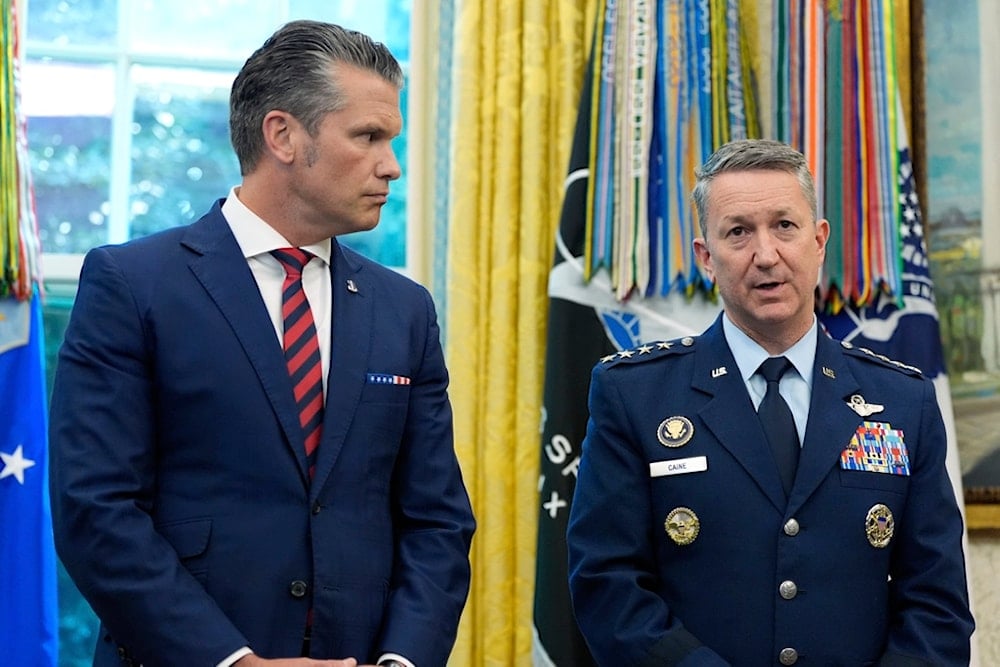Pentagon chief visits Puerto Rico as US threatens Venezuela
War Secretary Pete Hegseth made a surprise visit to Puerto Rico as the US expands military operations against drug cartels linked to Venezuela.
-

War Secretary Pete Hegseth listens as Chairman of the Joint Chiefs of Staff Gen. Dan Caine speaks during an event with President Donald Trump in the Oval Office of the White House, Friday, September 5, 2025, in Washington. (AP)
US Defense Secretary Pete Hegseth paid an unannounced visit to Puerto Rico on Monday as Washington expands its military operations in the region targeting drug cartels, officials confirmed.
Hegseth was joined by General Dan Caine, the top US military officer, and was welcomed by Puerto Rico’s governor, Jenniffer Gonzalez-Colon, who announced the visit on X. She thanked President Donald Trump and his administration “for recognizing the strategic value Puerto Rico has to the national security of the United States and the fight against drug cartels in our hemisphere, perpetuated by narco-dictator Nicolas Maduro.”
The United States has long accused Venezuelan President Nicolas Maduro of leading a cocaine trafficking cartel. Earlier this month, Washington doubled its bounty on Maduro to $50 million in exchange for his capture to face drug charges.
The visit follows a US strike last week on an alleged drug-smuggling boat from Venezuela, which Trump said killed 11 purported members of the Tren de Aragua gang. The strike, highly unusual in US counter-narcotics efforts, has fueled tensions with Caracas.
Venezuelan officials accused the Pentagon of provoking confrontation after US ships were reportedly buzzed in the Caribbean, while Maduro denounced the US military buildup and called for dialogue.
Trump escalates threats against Venezuela
Currently, eight US Navy vessels are engaged in counter-narcotics operations in Latin America, seven in the Caribbean, and one in the Pacific. Washington is also deploying 10 F-35 fighter jets to Puerto Rico as part of its efforts.
Trump vowed Friday that US forces would shoot down Venezuelan military aircraft if they threaten American assets. Meanwhile, critics noted that Washington’s strike against alleged cartel members without trial mirrors tactics used in the US “War on Terror.”
Hegseth and other officials have reiterated that such strikes against drug cartels will continue, as the Trump administration intensifies its campaign against Venezuela’s alleged role in hemispheric drug trafficking.
However, the Republican head of the Senate Homeland Security Committee has sharply criticized Vice President JD Vance for remarks appearing to endorse extrajudicial killings by the US military.
“Killing cartel members who poison our fellow citizens is the highest and best use of our military,” Vance wrote Saturday on X, defending last week’s US strike on a Venezuelan boat in the Caribbean Sea that left 11 people dead. The administration has alleged the victims were drug traffickers.
Vance added, “Democrats: let’s send your kids to die in Russia. Republicans: actually, let’s protect our people from the scum of the earth.”
'Counterterrorism operation' or extrajudicial killing?
No evidence of the alleged drug trafficking was submitted in the process.
“The strike occurred while the terrorists were at sea in international waters transporting illegal narcotics, heading to the United States,” Trump wrote on Truth Social. “The strike resulted in 11 terrorists killed in action. No U.S. Forces were harmed in this strike … Please let this serve as notice to anybody even thinking about bringing drugs into the United States of America. BEWARE!”
Strained relations
The attack has further strained US-Venezuelan relations. In August, Trump deployed warships and Marines to the Caribbean, moves supporters said were aimed at pressuring Venezuelan President Nicolas Maduro. On Friday, reports surfaced that 10 US F-35 fighter jets were being sent to Puerto Rico to back operations against suspected traffickers.
Some analysts warn that the escalation could spiral into direct conflict between US and Venezuelan forces.
Last month, Washington placed a $50 million bounty on Maduro, twice the amount once offered for Osama bin Laden, and in July, Trump signed a classified directive authorizing military action against Latin American cartels designated as "terrorist groups", including the Venezuelan Cartel de los Soles, which US officials have linked to Maduro.

 4 Min Read
4 Min Read










